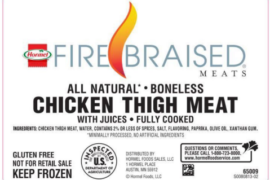Chicago, Illinois-headquartered McDonald’s Corporation, the world’s largest hamburger chain, on December 11 unveiled a policy to reduce the overall use of antibiotics important to human health, as defined by the World Health Organization (WHO), across 85% of its global beef supply chain. The announcement followed a notice issued by Issaquah, Washington-headquartered Costco Wholesale Corporation on December 7 stating that it is updating animal welfare standards to include an antibiotic policy that will limit the use of antibiotics in the company’s meat and poultry supply chains.
 “Antibiotic resistance is one of the greatest threats to mankind today. We commend McDonald’s effort to develop a global policy guiding how antibiotics are used within its beef supply chain. The company has set an ambitious timeline for implementing this policy and it’s heartening that it is setting reduction targets that will be transparent and reported publicly to its customers. It is our hope that the entire beef industry will follow McDonald’s leadership and adopt similar policies that reduce and where possible eliminate antibiotic use, while still allowing veterinarians to treat sick animals,” said Dr. Lance B. Price of the Antibiotic Resistance Action Center, Milken Institute School of Public Health, George Washington University.
“Antibiotic resistance is one of the greatest threats to mankind today. We commend McDonald’s effort to develop a global policy guiding how antibiotics are used within its beef supply chain. The company has set an ambitious timeline for implementing this policy and it’s heartening that it is setting reduction targets that will be transparent and reported publicly to its customers. It is our hope that the entire beef industry will follow McDonald’s leadership and adopt similar policies that reduce and where possible eliminate antibiotic use, while still allowing veterinarians to treat sick animals,” said Dr. Lance B. Price of the Antibiotic Resistance Action Center, Milken Institute School of Public Health, George Washington University.
McDonald’s understands that reducing the overall use of medically important antibiotics in beef is complex and cannot be accomplished overnight. Additionally, there is limited antibiotic usage data available across the global beef industry. That is why, in collaboration with suppliers and beef producers, it is taking a strategic and phased approach to the task, as detailed below:
- First, McDonald’s is partnering with supplying beef producers in the top 10 beef sourcing markets to measure and understand current usage of antibiotics across a diverse, global supply chain;
- By the end of 2020, based on what has been learned, the company will establish reduction targets for medically important antibiotics for these markets;
- Starting in 2022, progress against antibiotic reduction targets across the top 10 beef sourcing markets will be fully reported.
 McDonald’s has been developing this policy over the past year and a half, while consulting a cross-section of expert stakeholders from veterinarians, to public health leaders, to the beef producers responsible for taking care of the health of animals within the supply chain every day.
McDonald’s has been developing this policy over the past year and a half, while consulting a cross-section of expert stakeholders from veterinarians, to public health leaders, to the beef producers responsible for taking care of the health of animals within the supply chain every day.
The restaurant chain’s overall approach to responsible use of antibiotics focuses on refining their selection and administration, reducing their use, and ultimately replacing antibiotics with long-term solutions to prevent diseases and protect animal health and welfare. With this in mind, it remains committed to treating animals when needed.
“The path for creating and implementing a global antibiotic use policy for beef is unprecedented. I’ve been encouraged by the thoroughness with which McDonald’s has engaged diverse experts while creating this policy and the seriousness with which they take this important issue,” said Dan Thomas, MS, PhD, DVM, College of Veterinary Medicine, Kansas State University.
This latest announcement builds on fifteen years of progress since McDonald’s first developed a position on responsible antibiotics use in 2003. In 2016, McDonald’s USA reached its commitment to serve only chicken not treated with antibiotics important to human medicine, nearly one year ahead of schedule. Further, in 2017, it announced an expanded antibiotics policy for chicken in markets around the world, as well as a refreshed Vision for Antimicrobial Stewardship statement with commitments to create responsible-use antibiotic approaches for beef, dairy beef and pork.
Costco Eyes Compliance Date
 Meanwhile, wholesale giant Costco, which is famous for its $4.99 rotisserie chicken bargain deal and is in the process of developing a $275 million farm-to-table poultry production operation in Fremont, Nebraska, to complement a company-owned beef supply operation, has established new standards and monitoring requirements for antibiotic use among meat suppliers of all kinds.
Meanwhile, wholesale giant Costco, which is famous for its $4.99 rotisserie chicken bargain deal and is in the process of developing a $275 million farm-to-table poultry production operation in Fremont, Nebraska, to complement a company-owned beef supply operation, has established new standards and monitoring requirements for antibiotic use among meat suppliers of all kinds.
“Costco Wholesale’s goal is to control the use of antibiotics medically important to humans in its meat and poultry supply chains, consistent with protecting the health and welfare of our members and of poultry, hogs and cattle in our supply chains,” spelled out a posting on the company’s website. “Our policy is to limit application of these antibiotics to therapeutic use for the prevention, control and treatment of disease and not, for example, for purposes of growth promotion or feed efficiency, and only under the supervision of a licensed veterinarian in a valid veterinary-client-patient relationship.”
Prior to December of 2020 the company aims to set a target date by which compliance with the policy will be mandatory and monitored.





